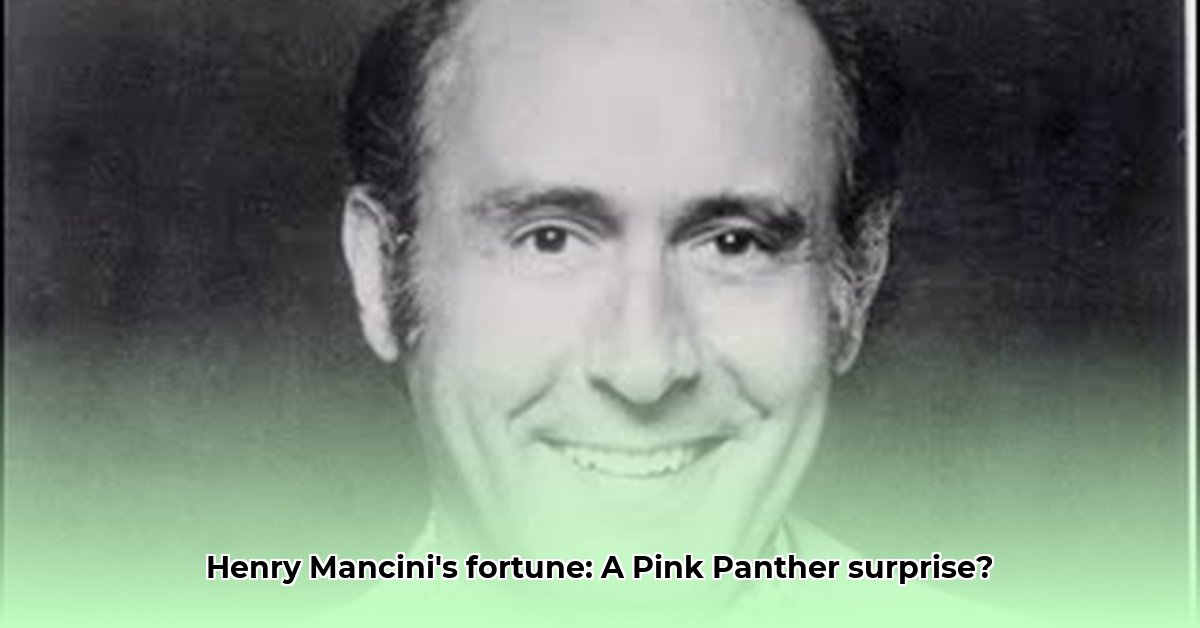
Henry Mancini's Musical Empire: From Modest Beginnings to Lasting Fortune
Henry Mancini's name is synonymous with iconic melodies. "The Pink Panther," "Moon River," and countless other unforgettable scores cemented his place in musical history. But beyond the artistic triumph lies a compelling financial narrative. His journey, from a $75-a-week salary at Universal-International to a substantial fortune, reveals not only exceptional musical talent but also a keen understanding of business strategy. His early career gains, like the jump to a $200-a-week salary after the success of "The Glenn Miller Story," foreshadowed his future financial prowess. The enduring popularity of his compositions, still recognizable and beloved today, continues to generate substantial revenue for his estate, underscoring the long-term value of smart investments in musical intellectual property. For comparison, see the net worth of other celebrities.
Unlocking the Mystery of Henry Mancini's Fortune: A Range of Estimates and Their Explanations
Pinpointing the exact net worth of Henry Mancini at the time of his death proves surprisingly challenging. Estimates vary significantly, ranging from approximately $10 million to as high as $50 million. This discrepancy stems from several factors. First, accounting practices differ, impacting the final valuation. Second, assessing the value of assets like real estate and future royalties—illiquid assets—is inherently complex. These assets are not easily converted to cash, adding to the difficulty of precise calculation. Finally, the fluctuating value of intellectual property, in this case, his musical copyrights, further complicates any definitive assessment. The constant stream of income from his enduringly popular music makes determining a precise figure even today a complex undertaking.
Beyond the Music: Mancini's Strategic Business Acumen
Mancini's financial triumph wasn't solely reliant on composing chart-topping scores. He possessed a keen business sense, recognizing the importance of long-term investments. A pivotal example is the establishment of his own music publishing company, Northridge Music Inc. This strategic move ensured a consistent income stream from licensing his music for commercials, films, and albums, thereby diversifying his revenue sources and mitigating financial risk. His reported $40 million sale of his publishing rights in 2005 further exemplifies his shrewd business acumen and the lasting value of his musical catalog. This demonstrates an exceptional understanding of long-term financial planning, securing his legacy well beyond his musical career's peak.
Henry Mancini's Enduring Legacy: Lessons for Various Stakeholders
Mancini's financial success offers valuable lessons across diverse fields. His enduring musical legacy and astute business practices serve as a model for wealth creation and long-term planning.
Key Insights for Different Stakeholders:
Musicians/Composers: Mancini's success highlights the importance of developing a strong personal brand, diversifying income streams beyond album sales, and investing wisely in the future. It underscores the importance of strategic planning—building an entire business around your craft.
Music Industry Professionals: Mancini's career emphasizes the ongoing value of classic compositions, especially in the context of media licensing and revenue generation, and the importance of adapting to the evolving digital media landscape.
Educational Institutions: Mancini's life and career provide an exceptional case study illustrating the intersection of artistic talent and astute business practices, inspiring future generations.
The ongoing debate about the precise value of Henry Mancini's net worth serves as a testament to the lasting power and value of his music. His story transcends mere financial success; it showcases the synergy between creative genius, strategic business planning, and the creation of a lasting legacy that continues to generate wealth long after his passing. It is a narrative of creativity, foresight, and disciplined financial management—a profound model of inspiration for aspiring musicians and entrepreneurs alike. Did his meticulous planning and diversified approach contribute to this enduring success? Absolutely. His legacy continues to resonate, both musically and financially.
How Did Henry Mancini Diversify His Income Streams Beyond Film Scoring?
How did Henry Mancini build such a substantial fortune beyond the immediate success of his iconic film scores? His approach was multifaceted, leveraging the enduring power of his music across various platforms.
While his film scores yielded significant upfront payments—and the Academy Award-winning "Moon River" is a prime example—his long-term financial success came from strategic licensing and royalties. Every time his music was played on television, radio, or in advertising, it generated income. This constant stream of revenue built a substantial, long-term financial foundation.
Mancini expanded his income streams by releasing his own albums, conducting concerts, and actively seeking licensing opportunities for television and commercials. His recognizable musical style allowed him to appeal to a broad audience, further solidifying his earning potential. This holistic approach ensured that his income wasn't solely dependent on a few high-profile film scores.
Even posthumously, Mancini's music continues to earn revenue via digital platforms and licensing deals, showcasing his visionary approach to long-term financial planning. His example serves as a powerful case study for artists and entrepreneurs, demonstrating the value of diversification, strategic licensing, and recognizing the long-term value of one's intellectual property.